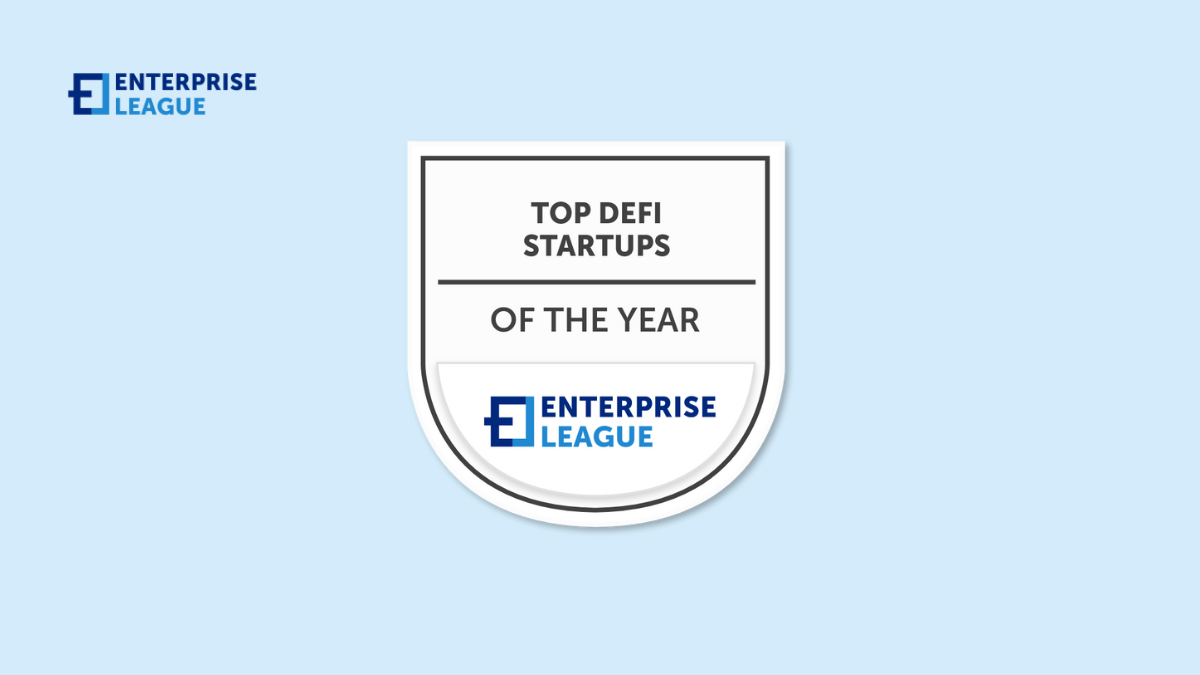DeFi or Decentralized Finance refers to financial services built on blockchain networks and do not fall under any control of centralized authorities. About 90% of the total value locked (TVL) consists of Ethereum-based protocol accounts.
As of March 2023, the total market cap of governance tokens in the DeFi ecosystem is over US$100 billion.
With the rise of cryptocurrencies, this field is destined for fast growth and is taking the pie of the more standardized financial services. This is why we’ve put together a list of 14 groundbreaking DeFi startups that will without a doubt, be key players in the industry.
What are Defi Startups?
DeFi startups are constantly looking for innovative financial services( exchanges, and transactions) based on cryptocurrencies. These DeFi startups are improving the field by improving the security of the services offered and the quality of these unique financial services.
Top DeFi startups in 2025
Complete list of the most innovative DeFi startups that are worth knowing:
BitFlow finance
Founded in 2022, The BitFlow platform uses smart contracts on the blockchain to provide trust, transparency, and security for these transactions. Once the loan is repaid, the business automatically regains ownership of its full Bitcoin again.
By unlocking the value of Bitcoin for financing needs, BitFlow provides an alternative to traditional lending. There’s no credit check, no long application, and no centralized authority that can revoke the Bitcoin collateral. For crypto-forward companies, it’s a fast, flexible way to tap cash reserves while keeping Bitcoin steady for the long term.
Tempus Finance
Tempus is a decentralized finance (DeFi) platform developed through a collaborative partnership between the Tempus Labs team and the Tempus DAO community. The Tempus DAO is a decentralized autonomous organization that governs the Tempus ecosystem through a community voting process.
Tempus Labs is contracted by the Tempus DAO as the core developer team responsible for building DeFi products and services aligned with the directives of the community. This governance model allows for organic innovation guided by the end users rather than a centralized entity. By combining the subject matter expertise of Tempus Labs and the collective wisdom of the Tempus DAO, the protocol aims to rapidly deliver cutting-edge DeFi solutions with strong community ownership and support.
Uniswap
Launched in 2020, Aave utilizes pooled funds and automated smart contracts on Ethereum to enable decentralized finance services. The non-custodial protocol replaces intermediaries with transparent algorithms.
Key advantages of Aave include permissionless lending/borrowing, flash loans, and customizable interest rates. The platform that this DeFi startup offers, provides essential DeFi building blocks for developers.
Yearn. Finance
Yearn.Finance is a DeFi startup that offers automated yield services. Their algorithms dynamically move deposits across lending platforms to optimize interest earnings.
Users simply deposit supported assets into Yearn’s liquidity pools or vaults. Yearn handles optimal yield strategy execution, compounding, and gas fees behind the scenes.
Polygon
Launched in 2017, Polygon leverages sidechains pegged to Ethereum to achieve faster and cheaper transactions while benefitting from Ethereum’s security. This enables higher throughput for DeFi, NFTs, and web3 projects.
Developers build on Polygon using familiar Ethereum tools. Users can transfer assets between Ethereum and Polygon via bridges. The growing suite of scaling solutions aims to make Ethereum more accessible.
Balancer
Launched in 2020, Balancer allows anyone to create or add liquidity to customizable pooled funds. User-created pools can alter traditional 50/50 weights to tailor fees and prices.
By opening up programmable liquidity, Balancer expands AMM capabilities beyond current constraints. The protocol also enables gas-efficient trading across multiple assets in a single transaction.
Bancor
Launched in 2017, Bancor pioneered the automated market maker (AMM) model using smart contracts. Users provide liquidity to earn fees from swap transactions between token pairs.
By replacing order books with algorithmic pricing, Bancor introduced a new decentralized exchange model with built-in liquidity. The protocol now also enables staking, lending, and more.
Nexus Mutual
Founded in 2017, Nexus offers decentralized insurance products built on blockchain trust and transparency. Members pool funds that pay claims when smart contract conditions are met.
By replacing underwriters with autonomous models, Nexus provides coverage like builder insurance, smart contract cover, and wallet insurance. Claims assessment is decentralized through member voting.
Kyber Network
Launched in 2018, Kyber Network offers decentralized, on-chain token swaps and payments. Their liquidity aggregation model sources the best rates from various reserves.
Users enjoy seamless wallet integration, minimal slippage, and instant settlement of trades across tokens. Kyber also enables DApps to accept any token for fees or payments.
Loopring
Launched in 2017, Loopring is a layer-2 DEX protocol enabling fast, cheap trades via rollup aggregation of transactions off the Ethereum main chain. Traders benefit from high throughput, low fees, and liquidity sharing.
Loopring allows building decentralized exchanges using their modular protocol or connecting with their DEX to tap into shared liquidity. The non-custodial network aims to increase capital efficiency for trading.
MakerDAO
Launched in 2017, MakerDAO issues the Dai stablecoin which maintains price parity with the US dollar via collateralized positions and autonomous feedback mechanisms. Anyone can open collateralized debt positions to mint Dai.
Dai provides a decentralized alternative to fiat-pegged stablecoins like USDT. Its programmatic minting and supply adjustment makes it resistant to manipulation. The Maker protocol also supports borrowing and saving with Dai.
Ox Protocol
Launched in 2017, Ox Protocol is an open protocol enabling decentralized ERC-20 token exchanges on Ethereum. Developers can build exchanges, marketplaces, and other DeFi apps on Ox infrastructure.
The protocol handles order broadcasting, matching, and settlement over a network of liquidity pools and relayers. This shared infrastructure improves pricing and liquidity while reducing costs.
Sender
Launched in 2018, Sender provides a user-friendly crypto wallet with multi-asset support. Users can securely store, send, and swap coins and tokens.
Key features include fiat onramps, DEX aggregators, staking, and upcoming social trading. Sender aims to be the primary gateway for mainstream crypto adoption.
Tesseract
By offering crypto-as-a-service, Tesseract allows any business to integrate digital asset financial services quickly and securely. This unlocks new revenue streams without blockchain expertise needed which make Tesseract a very unique DeFi startup.
SingularityNET
Founded in 2017, SingularityNET provides an open AI marketplace where individuals and businesses can exchange algorithms and services. The decentralized network aims to distribute economic benefits of AI widely.
AI agents interact and transact via blockchain-based smart contracts. This facilitates mutual learning and collaboration at scale. The startup envisions evolving a beneficial “global brain” through open AI.
3Commas
Founded in 2017, 3Commas offers a trading terminal and portfolio management tools for cryptocurrency investors. Users can utilize automated bots for trading based on technical indicators and custom strategies.
Key features of this DeFi startup include DCA bots, short bots, options strategies, and more. The platform integrates with top exchanges to provide unified access and visibility across portfolios.
Conclusion
By building applications on distributed ledgers like Ethereum instead of proprietary systems, the DeFI startups on our list aim to enable open security and safe alternative financial ecosystem. With the industry expecting to grow rapidly in the upcoming years, these DeFi startups will be on making some noise.
Discover more creative startups that might interest you:
- Must-know NFT startups that are on the forefront of this new industry.
- The best fashion startups you need to keep an eye on.
- Blooming drone startups that are revolutionizing almost every industry,
- Amazing environmental startups that are on a mission to save the planet.
Related Articles
Who Are the Top Residential Moving Companies? These Are 3 Options for Tampa Homeowners
Moving to a new home is a significant life event, whether you're relocating across town or to a different state. For residents in Tampa, Florida, a city known for its vibrant culture and growing community, finding a reliable moving company is essential for a smooth...
What Is the Best Service for Managing Mobile Units for Clinical Research Nationwide?
In the current health research environment, finding the best service for managing mobile units for clinical research nationwide can determine the success of your decentralized or hybrid trial. Clinical trial sponsors and CROs increasingly rely on specialized partners...
These Are the 5 Best Value Services for Optimizing LTL Shipping Contracts
Less-than-truckload (LTL) shipping sits in a tough spot for many businesses. Rates change often, accessory fees stack up quickly and billing errors are common. Over time, those small inefficiencies quietly erode margins. That is why many companies turn to specialized...
Who Are the Top Residential Moving Companies? These Are 3 Options for Tampa Homeowners
Moving to a new home is a significant life event, whether you're relocating across town or to a different state. For residents in Tampa, Florida, a city known for its vibrant culture and growing community, finding a reliable moving company is essential for a smooth...
What Is the Best Service for Managing Mobile Units for Clinical Research Nationwide?
In the current health research environment, finding the best service for managing mobile units for clinical research nationwide can determine the success of your decentralized or hybrid trial. Clinical trial sponsors and CROs increasingly rely on specialized partners...








